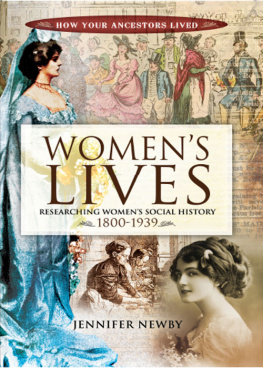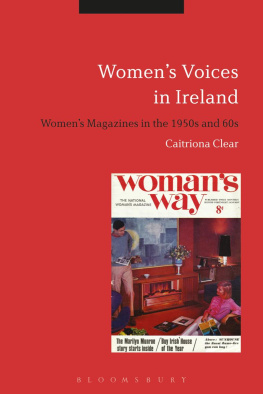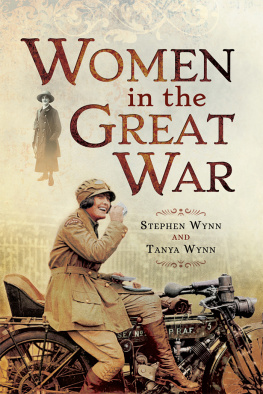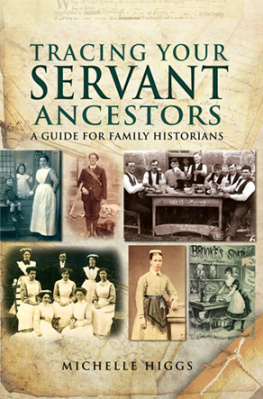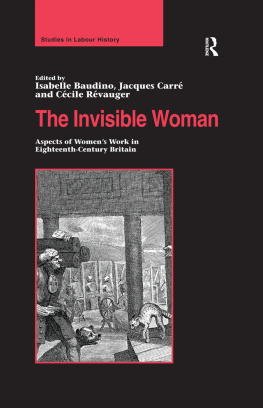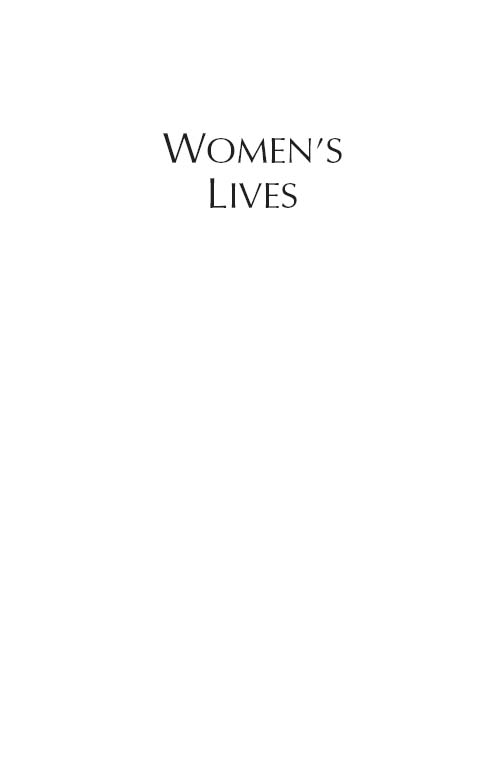
FAMILY HISTORY FROM PEN & SWORD
Tracing Your Channel Islands Ancestors
Marie-Louise Backhurst
Tracing Your Yorkshire Ancestors
Rachel Bellerby
Tracing Your Royal Marine Ancestors
Richard Brooks and Matthew Little
Tracing Your Pauper Ancestors
Robert Burlison
Tracing Your Labour Movement Ancestors,
Mark Crail
Tracing Your Army Ancestors
Simon Fowler
A Guide to Military History on the Internet
Simon Fowler
Tracing Your Northern Ancestors
Keith Gregson
Your Irish Ancestors
Ian Maxwell
Tracing Your Scottish Ancestors
Ian Maxwell
Tracing Your London Ancestors
Jonathan Oates
Tracing Your Tank Ancestors
Janice Tait and David Fletcher
Tracing Your Air Force Ancestors
Phil Tomaselli
Tracing Your Secret Service Ancestors
Phil Tomaselli
Tracing Your Criminal Ancestors
Stephen Wade
Tracing Your Police Ancestors
Stephen Wade
Tracing Your Jewish Ancestors
Rosemary Wenzerul
Fishing and Fishermen
Martin Wilcox
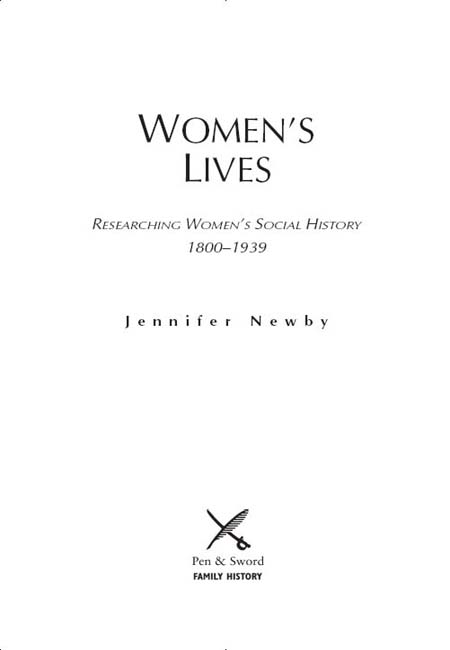
First published in Great Britain in 2011 by
PEN & SWORD FAMILY HISTORY
an imprint of
Pen & Sword Books Ltd
47 Church Street
Barnsley
South Yorkshire
S70 2AS
Copyright Jennifer Newby 2011
ISBN 978 1 84884 368 4
Digital Edition ISBN: 978 1 84468 654 4
The right of Jennifer Newby to be identified as Author of this Work has been
asserted by her in accordance with the Copyright,
Designs and Patents Act 1988.
A CIP catalogue record for this book is
available from the British Library.
All rights reserved. No part of this book may be reproduced or transmitted in any form or by any means, electronic or mechanical including photocopying, recording or by any information storage and retrieval system, without permission from the Publisher in writing.
Typeset in Palatino and Optima by
by Phoenix Typesetting, Auldgirth, Dumfriesshire
Printed and bound in England by
CPI UK
Pen & Sword Books Ltd incorporates the imprints of
Pen & Sword Aviation, Pen & Sword Family History, Pen & Sword Maritime, Pen &
Sword Military, Pen & Sword Discovery, Wharncliffe Local History, Wharncliffe
True Crime, Wharncliffe Transport, Pen & Sword Select, Pen & Sword Military
Classics, Leo Cooper, The Praetorian Press, Remember When, Seaforth Publishing
and Frontline Publishing.
For a complete list of Pen & Sword titles please contact
PEN & SWORD BOOKS LIMITED
47 Church Street, Barnsley, South Yorkshire, S70 2AS, England
E-mail: enquiries@pen-and-sword.co.uk
Website: www.pen-and-sword.co.uk
ACKNOWLEDGEMENTS
With thanks to: Sergio Goncalves Coelho, Wendy Parsons, Marielle Reuser and Julie and Graham Newby, for encouragement and support; and Simon Fowler and Penny Law for valuable editorial criticism.
Introduction
RESEARCHING
WOMENS HISTORY
S ometimes it can seem as though there are two histories: an active military, political and creative male history, and another invisible domestic history: womens history. Of course, this is nonsense. Women have always taken active roles in history - sometimes in unlikely ways, but these have been less well documented. Fewer women were literate, their achievements were less likely to be recognised and, until recently, they did not have the same educational or career opportunities as men.
You might think that it is impossible to research these invisible women, that their lives went on out of sight and have already been consigned to the dust heap of history, yet this is not true. While women are often poorly represented in the archives, with a bit of creativity and luck, it is possible to find fruitful research sources. In some cases you will use the same sources that you would consult to research men, but you will be looking for different things, often for the stories behind the dates and names. By comparing marriage and birth certificates, you could learn that a woman was pregnant when she married or that she was making a financially advantageous match.
While researching this book, I spent a great deal of time at The National Archives unwrapping fragile documents and discovering pieces of obscure womens lives. I was particularly touched by the story of Amy Gregory, a young married woman in her early twenties, who somehow became destitute in the late nineteenth century. In January 1894, Amy gave birth to a daughter, Frances Maud, in the workhouse, but soon left the institution to try to find work. Amy appealed to local housewives for charity, tramping the streets daily, looking for a job. Alone, penniless and half-mad with hunger, she abandoned Frances in Richmond Park. The authorities soon tracked Amy down, and she was tried and sentenced to death. Her case received a great deal of sympathetic press coverage and the Home Secretary commuted her sentence to life imprisonment.
I traced Amy further through the archives, and discovered that she served just five years at Aylesbury Prison and was released in 1899. She was initially placed in service through a home of refuge in Oxford, but her husband took her home to Richmond instead. Amy wrote to the refuge: We are very happy and we have got a nice home here I am doing well, and happy with my husband and my loving children. In the 1901 census, Amy and James were still living together.
Like any piece of historical research, Amys story left many unanswered questions: why was she separated from her husband? why didnt she take Frances back to the workhouse, if she could not feed her? While there are plenty of places to research women in the nineteenth and early twentieth centuries, you will not always be able to find the exact information that you are looking for, or may discover something entirely unexpected instead.
In the following chapters I have tried to show what kind of material you might find if you look at wider social history alongside individual lives. I have focused on more recent history, from the 1800s to the 1930s, which has a huge range of archives and resources for researchers. I chose to divide the chapters into types of occupation and social class, because these labels - perhaps more so than any others - were the ones which our female ancestors were conscious of, and found difficult to escape.
While women were excluded from many occupations during the nineteenth century, they constantly entered new ones, for example as doctors, shorthand typists, waitresses and shop assistants. In 1919, the Ministry of Reconstruction reported on the range of jobs that women did:
Large numbers of married women are known to work in seasonal trades, such as jam-making and fish-curing, as charwomen, as school and office cleaners In many districts married women are largely employed for part of the year in agricultural work, and they are to be found engaged in practically all forms of unskilled and casual work open to women, while they form a considerable proportion of the homeworkers.
I felt that it was important to focus on working-class women, as they constituted the majority of the population. A large proportion had to support themselves and their families, and I have included chapters on domestic service, agricultural labour and factory work. These by no means cover the whole range of work that women did, but they do chart conditions and womens experiences in that particular area at the time. Some of their stories are incredibly poignant: for instance, charity worker Frances Power Cobbes memoirs record the story of two women in late-nineteenth-century Bristol who worked together to make a living using just one pair of sheets and a bit of ingenuity:

